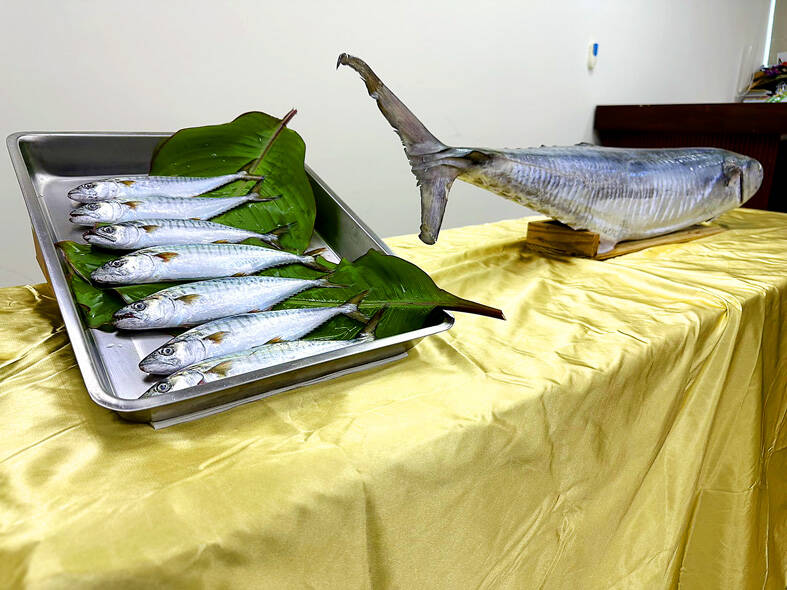The Fisheries Research Institute on Friday said it had completed an experiment to artificially inseminate narrow-barred Spanish mackerels at sea, successfully reproducing fries.
The institute said it would continue to develop technology geared toward raising the mackerels and making the fish a flagship product for Taiwan.
The narrow-barred Spanish mackerel is a migratory species and has long been a favorite among Taiwanese.

Photo: Yang Yuan-ting, Taipei Times
However, due to changes in the maritime environment, the total catch around Taiwan has dropped from 3,200 tonnes in 2001 to about 500 tonnes last year.
The increasing scarcity of the mackerels has driven the price to NT$1,300 per kilogram, the institute said, adding that the price tends to spike around Lunar New Year, reaching about NT$1,500 per kilogram.
Other countries, such as Japan and Saudi Arabia, have also considered developing the technology to artificially inseminate the narrow-barred Spanish mackerel.
However, the fish, which has proved to be aggressive and has no scales to protect it, often failed to live long enough after leaving the water, it said, making it very difficult to extract its gonads, the Littoral Marine Resource Research Center director Weng Chin-hsing (翁進興) said.
The institute, working with fishers in Penghu County, has captured the fish and obtained its gonads, he said.
The fry grew to 7 to 15cm within 45 days, the center said.
While artificial insemination was successful, the center found that the fries were extraordinarily aggressive and would attempt to eat other fries in the group it said, adding that the fish developed teeth as early as their fifth day.
With its larger pool, a Tainan facility had achieved a 0.2 percent survival rate for the fry, Weng said, adding that the center hoped to increase the survival rate to 50 to 70 percent.
Institute director Chang Chin-yi (張錦宜) said that it would trial a project to raise 10cm narrow-barred Spanish mackerel fry off Penghu County in an attempt to repopulate the species.
Chang added that net cages would be the ideal method of raising the fish.
The captain of the Peng Shan No. 100, Tsai Tsung-wei (蔡宗衛), who helped the institute with its experiments, said three generations of his family had been fishers in the Penghu area, adding that he remembered in his grandfather’s time, the narrow-barred Spanish mackerel population in the area had already decreased.
He is helping the institute in the hope of restoring the fish population in the area and allowing mackerel catches to make his vocation sustainable, he said.
Additional reporting by CNA

‘DENIAL DEFENSE’: The US would increase its military presence with uncrewed ships, and submarines, while boosting defense in the Indo-Pacific, a Pete Hegseth memo said The US is reorienting its military strategy to focus primarily on deterring a potential Chinese invasion of Taiwan, a memo signed by US Secretary of Defense Pete Hegseth showed. The memo also called on Taiwan to increase its defense spending. The document, known as the “Interim National Defense Strategic Guidance,” was distributed this month and detailed the national defense plans of US President Donald Trump’s administration, an article in the Washington Post said on Saturday. It outlines how the US can prepare for a potential war with China and defend itself from threats in the “near abroad,” including Greenland and the Panama

A wild live dugong was found in Taiwan for the first time in 88 years, after it was accidentally caught by a fisher’s net on Tuesday in Yilan County’s Fenniaolin (粉鳥林). This is the first sighting of the species in Taiwan since 1937, having already been considered “extinct” in the country and considered as “vulnerable” by the International Union for Conservation of Nature. A fisher surnamed Chen (陳) went to Fenniaolin to collect the fish in his netting, but instead caught a 3m long, 500kg dugong. The fisher released the animal back into the wild, not realizing it was an endangered species at

The High Prosecutors’ Office yesterday withdrew an appeal against the acquittal of a former bank manager 22 years after his death, marking Taiwan’s first instance of prosecutors rendering posthumous justice to a wrongfully convicted defendant. Chu Ching-en (諸慶恩) — formerly a manager at the Taipei branch of BNP Paribas — was in 1999 accused by Weng Mao-chung (翁茂鍾), then-president of Chia Her Industrial Co, of forging a request for a fixed deposit of US$10 million by I-Hwa Industrial Co, a subsidiary of Chia Her, which was used as collateral. Chu was ruled not guilty in the first trial, but was found guilty

DEADLOCK: As the commission is unable to forum a quorum to review license renewal applications, the channel operators are not at fault and can air past their license date The National Communications Commission (NCC) yesterday said that the Public Television Service (PTS) and 36 other television and radio broadcasters could continue airing, despite the commission’s inability to meet a quorum to review their license renewal applications. The licenses of PTS and the other channels are set to expire between this month and June. The National Communications Commission Organization Act (國家通訊傳播委員會組織法) stipulates that the commission must meet the mandated quorum of four to hold a valid meeting. The seven-member commission currently has only three commissioners. “We have informed the channel operators of the progress we have made in reviewing their license renewal applications, and